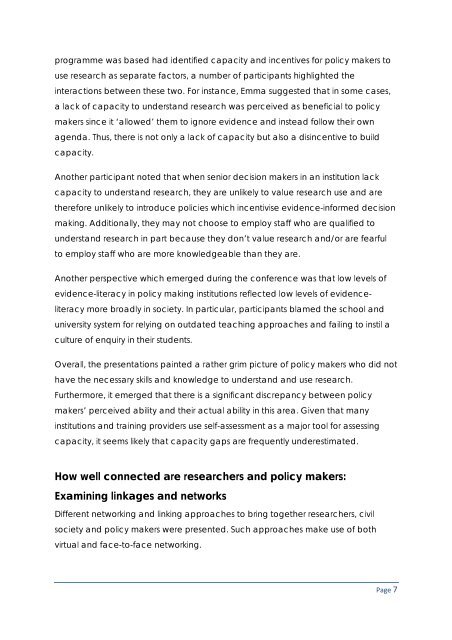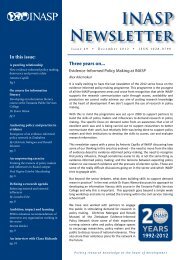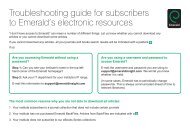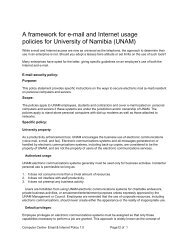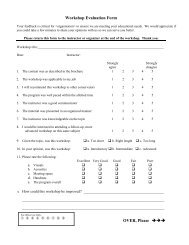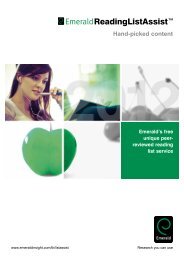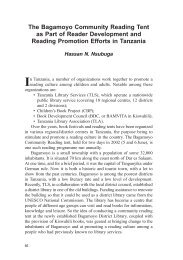What is the evidence on evidence-informed policy making? - INASP
What is the evidence on evidence-informed policy making? - INASP
What is the evidence on evidence-informed policy making? - INASP
You also want an ePaper? Increase the reach of your titles
YUMPU automatically turns print PDFs into web optimized ePapers that Google loves.
programme was based had identified capacity and incentives for <strong>policy</strong> makers to<br />
use research as separate factors, a number of participants highlighted <str<strong>on</strong>g>the</str<strong>on</strong>g><br />
interacti<strong>on</strong>s between <str<strong>on</strong>g>the</str<strong>on</strong>g>se two. For instance, Emma suggested that in some cases,<br />
a lack of capacity to understand research was perceived as beneficial to <strong>policy</strong><br />
makers since it ‘allowed’ <str<strong>on</strong>g>the</str<strong>on</strong>g>m to ignore <str<strong>on</strong>g>evidence</str<strong>on</strong>g> and instead follow <str<strong>on</strong>g>the</str<strong>on</strong>g>ir own<br />
agenda. Thus, <str<strong>on</strong>g>the</str<strong>on</strong>g>re <str<strong>on</strong>g>is</str<strong>on</strong>g> not <strong>on</strong>ly a lack of capacity but also a d<str<strong>on</strong>g>is</str<strong>on</strong>g>incentive to build<br />
capacity.<br />
Ano<str<strong>on</strong>g>the</str<strong>on</strong>g>r participant noted that when senior dec<str<strong>on</strong>g>is</str<strong>on</strong>g>i<strong>on</strong> makers in an instituti<strong>on</strong> lack<br />
capacity to understand research, <str<strong>on</strong>g>the</str<strong>on</strong>g>y are unlikely to value research use and are<br />
<str<strong>on</strong>g>the</str<strong>on</strong>g>refore unlikely to introduce policies which incentiv<str<strong>on</strong>g>is</str<strong>on</strong>g>e <str<strong>on</strong>g>evidence</str<strong>on</strong>g>-<strong>informed</strong> dec<str<strong>on</strong>g>is</str<strong>on</strong>g>i<strong>on</strong><br />
<strong>making</strong>. Additi<strong>on</strong>ally, <str<strong>on</strong>g>the</str<strong>on</strong>g>y may not choose to employ staff who are qualified to<br />
understand research in part because <str<strong>on</strong>g>the</str<strong>on</strong>g>y d<strong>on</strong>’t value research and/or are fearful<br />
to employ staff who are more knowledgeable than <str<strong>on</strong>g>the</str<strong>on</strong>g>y are.<br />
Ano<str<strong>on</strong>g>the</str<strong>on</strong>g>r perspective which emerged during <str<strong>on</strong>g>the</str<strong>on</strong>g> c<strong>on</strong>ference was that low levels of<br />
<str<strong>on</strong>g>evidence</str<strong>on</strong>g>-literacy in <strong>policy</strong> <strong>making</strong> instituti<strong>on</strong>s reflected low levels of <str<strong>on</strong>g>evidence</str<strong>on</strong>g>literacy<br />
more broadly in society. In particular, participants blamed <str<strong>on</strong>g>the</str<strong>on</strong>g> school and<br />
university system for relying <strong>on</strong> outdated teaching approaches and failing to instil a<br />
culture of enquiry in <str<strong>on</strong>g>the</str<strong>on</strong>g>ir students.<br />
Overall, <str<strong>on</strong>g>the</str<strong>on</strong>g> presentati<strong>on</strong>s painted a ra<str<strong>on</strong>g>the</str<strong>on</strong>g>r grim picture of <strong>policy</strong> makers who did not<br />
have <str<strong>on</strong>g>the</str<strong>on</strong>g> necessary skills and knowledge to understand and use research.<br />
Fur<str<strong>on</strong>g>the</str<strong>on</strong>g>rmore, it emerged that <str<strong>on</strong>g>the</str<strong>on</strong>g>re <str<strong>on</strong>g>is</str<strong>on</strong>g> a significant d<str<strong>on</strong>g>is</str<strong>on</strong>g>crepancy between <strong>policy</strong><br />
makers’ perceived ability and <str<strong>on</strong>g>the</str<strong>on</strong>g>ir actual ability in th<str<strong>on</strong>g>is</str<strong>on</strong>g> area. Given that many<br />
instituti<strong>on</strong>s and training providers use self-assessment as a major tool for assessing<br />
capacity, it seems likely that capacity gaps are frequently underestimated.<br />
How well c<strong>on</strong>nected are researchers and <strong>policy</strong> makers:<br />
Examining linkages and networks<br />
Different networking and linking approaches to bring toge<str<strong>on</strong>g>the</str<strong>on</strong>g>r researchers, civil<br />
society and <strong>policy</strong> makers were presented. Such approaches make use of both<br />
virtual and face-to-face networking.<br />
Page 7


